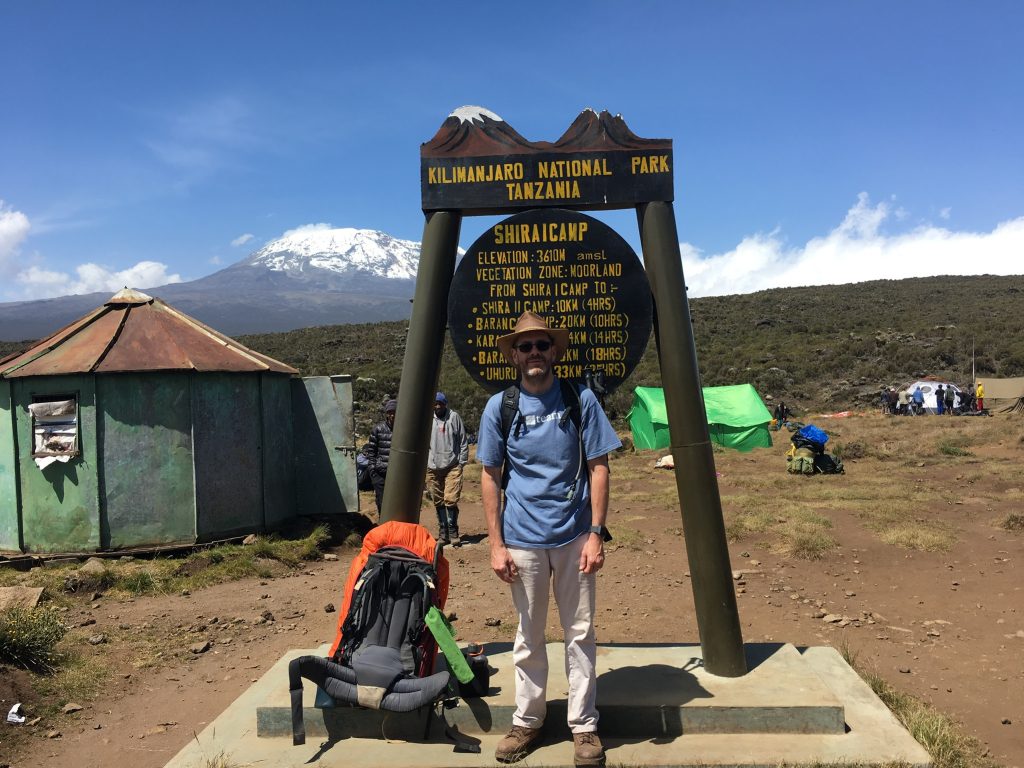
Missionary Life
What Can Mount Kilimanjaro Teach You About God?
January 8, 2019
by Mark Watson

As a missionary to Swaziland, my job feels like a vacation, so I don’t often take one. But this year, friends and family gave a generous gift with strict instructions that the money was to be used on something I wanted to do — but not on anything ministry related. Some friends and I decided that, despite my being 54, we should climb to the highest peak in Africa.
When we arrived at the base of Kilimanjaro, the guides told us there are four rules to follow to summit the mountain. He told us we must:
- Have a good attitude.
- Eat well – even if our appetite slips, we need the energy.
- Drink lots of water –and don’t just wait until you’re thirsty.
- Pole pole (pronounced pho-lay, pho-lay), which means move slowly, slowly, but keep moving.
At the bottom of the hill, these seemed like simple rules. Rules we would keep without effort. Rules we didn’t even need to think about. But by 11:00 p.m., moving from high base camp for the overnight hike to the summit, they were pretty much all we could think about.
As we walked down the mountain, I thought about the spiritual applications of these truths. They seem so simple, but when the pressure is on, they make all the difference. And I realized they’re true whether we’re climbing a physical mountain, or the spiritual mountains we all face.
- Have a Good Attitude
Philippians 2:5–7 records Paul’s description of a good attitude: “Have the same mindset as Christ Jesus: Who, being in very nature God, did not consider equality with God something to be used to his own advantage; rather, he made himself nothing by taking the very nature of a servant.…”
A hard-won victory is best built on a foundation of humility.
It was easy to be humble in the face of that colossal mountain and the breathtaking beauty of God’s creation. If we have eyes to see, we can experience that same humility throughout our lives as we face each challenging mountain, delight in God’s beautiful creation and enjoy the gift of salvation.

The hike up Kilimanjaro takes at least five days. Proper nutrients are a must for the climb — just as they are for our faith journey. Photo courtesy of Brett Miller.
2/3. Eat Well and Drink Lots of Water
These rules made me think of Matthew 4:4, where Jesus said, “It is written: Man shall not live on bread alone, but on every word that comes from the mouth of God.”
It’s important that we have good nutrition — physically and spiritually — for life’s mountains. And just as we need water to process our food, we need the Spirit to enlighten our reading of God’s word.
“This is what we speak, not in words taught us by human wisdom but in words taught by the Spirit, explaining spiritual realities with Spirit-taught words. The person without the Spirit does not accept the things that come from the Spirit of God but considers them foolishness, and cannot understand them because they are discerned only through the Spirit” (1 Corinthians 2:13–14, NIV).

Just like in mountain climbing, it can be tempting to rush toward spiritual victories. But doing so risks injury or burnout. It is best to take our time. Photo courtesy of Brett Miller.
- Go Slowly, Slowly
“Pole pole” seemed like foolishness. Some groups ran past us. Fit 20-somethings with marathon shirts went skipping by, singing loudly (giving me great opportunity to practice patience). Our group walked, pole pole.
One afternoon, we heard the helicopter come to take someone away. We heard that some of the ‘‘skippers” did not make the top. We were passed, and then passed others, who collapsed on the way to the 19,341-foot summit. Pole pole — step by step.
Christians are prone to making one of two mistakes.
Some sit in the camp. They argue about the food, about the water. They want what’s best, but they never leave camp — they just sit and argue. That is no way to make the summit.
Others grab a quick bite in camp and then run to the summit. At some point, the resource is all used up, and they are all burned out. They stop short of the summit as well.
The people who summit the mountain eat well, then they leave camp. Every step, pole pole, to toward the goal.

With perseverance, nourishment and rest, Brett Miller reached the summit of Mount Kilimanjaro. Photo courtesy of Brett Miller.
Reaching the Summit
The author of Hebrews writes, “Therefore, since we are surrounded by such a great cloud of witnesses, let us throw off everything that hinders and the sin that so easily entangles. And let us run with perseverance the race marked out for us, fixing our eyes on Jesus, the pioneer and perfecter of faith. For the joy set before him he endured the cross, scorning its shame, and sat down at the right hand of the throne of God” (Hebrews 12:1–2, NIV).
Let us run with perseverance with our eyes fixed on Jesus. Then our attitude will be humble, our diet healthy, our water plentiful and the summit of the mountain . . . a gift from God!
Climbing the mountain is always better with a guide! Connect with a missions coach for counseling and guidance as you begin your missions journey.


